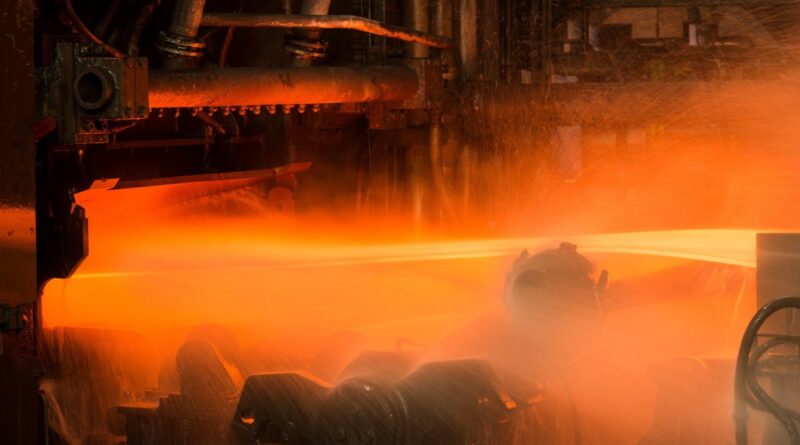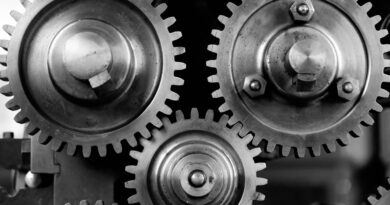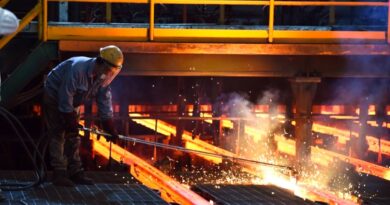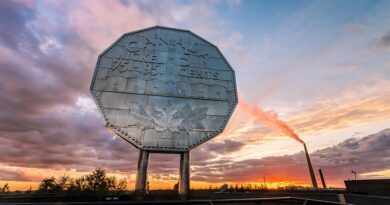ArcelorMittal: reducing fixed cost structure is critical
The largest African steelmaker, ArcelorMittal South Africa, says extraordinary cash management and cost control measures have been implemented to ensure liquidity in response to disrupted and seized supply chains.
It produced 54% less liquid steel at 1.1 million tonnes for the first half 2020. As average international steel prices fell by 13%, the company reported 47% lower sales volumes at 1.1 million tonnes, resulting in 45% reduction in revenue to R12 014 million and R1 256 million EBITDA loss against R167 million profit in H1 2019.
Headline loss amounted to R2 613 million (2019: R638 million loss). Net debt slightly increased to R3 702 million (December 2019: R3 370 million).
Strategic asset footprint review in 2020 resulted in temporary idling of Vanderbijlpark Blast Furnace C from the second quarter and Vereeniging Electric Arc Furnace from the third quarter of 2020, until demand recovers.
Following an already demanding 2019, the first half of 2020 proved to be an incredibly difficult and extraordinary period, the likes of which has never been witnessed in terms of the widespread social and business impact as wrought by the global COVID-19 pandemic. The impact on economic activity was abrupt and, therefore, the business response needed to be sharp and decisive.
The unprecedented and rapid shutdown of the company’s assets tapped into the world-class skills of the local operational team and global knowledge base of the ArcelorMittal group in order to affect the process safely and in a manner that would enable a swift but well-controlled restart.
In addition to substantial and sustainable cost improvements implemented to date, extraordinary cash management and cost control measures were implemented to ensure sufficient liquidity in response to disrupted and seized supply chains due to the pandemic.
With all but small volumes of commercial market coke sales to ferro-alloy producers possible in the first month of the lockdown starting on 27 March 2020, reducing the fixed cost structure of the company became critical to rescale cash outflows to dramatically reduced cash inflows.
With the advent of lockdown level 4 on 1 May 2020 and the ability to operate at 50% of normal labour levels, the company was able to avoid restarting its iron and steel melting operation by focusing on completing (rolling and packing) its work-in-process inventories and dispatching its finished inventories.
On 1 June 2020, level 3 allowed for a return to unrestricted operations, however, the return to full operational capacity is only expected as demand improves. Although more customers began operating, the vast majority operated on reduced shift patterns, impacting demand levels.
With an anticipation that, for the foreseeable future, steel demand will remain at best between 70% to 75% of levels prior to the lockdown, ArcelorMittal South Africa announced a large-scale labour reorganisation on 18 June 2020, in response to economic consequences of the pandemic.
The lockdown and its consequences overpoweringly defined the first half of the year, and specifically the second quarter, however, the following should be noted regarding the first quarter:
- Demand remained weaker than anticipated as the bad news regarding the spread of COVID-19 and the anticipated (and now realised) sovereign downgrades depressed business sentiment.
- Significant production interruptions occurred due to (i) electricity load shedding, and (ii) raw material train cancellation and delays due to a major increase in cable theft.
The combined negative impact of these uncontrollable events on earnings amounts to at least R272 million. These events and the consequential stop-start shocks are beginning to materially affect the reliability of plant and equipment, and are consequently diluting the improved underlying performance of the business.
Regarding the second quarter, the following was apparent:
- Total steel sales volumes fell by 54% (425 000 tonnes) to 361 000 tonnes compared to the first quarter.
- Liquid steel production was limited to 153 000 tonnes with the blast furnaces being idle for the months of April and May 2020.
- Additional externally purchased energy costs of R328 million were incurred during the lockdown due to the idling of the blast furnaces and the hot idling of certain of the coke-making batteries. These costs were related to an increase in the consumption of gases which are internally produced under normal operating conditions.
- Fixed costs reduced by 35% (R540 million) compared to the first quarter.
Positively, the Business Transformation Programme (BTP) contributed R663 million (2019: R635 million) in earnings improvements for the first half of the year, adding to the R2,1 billion of improvements since the programme started in the second half of 2018. This performance was achieved despite the interruptions which characterised the economic lockdown.
Compared to the previous year, exchange rates between the ZAR and the USD weakened significantly. Ordinarily, a weakening exchange rate has a positive impact on the financial results of the company. However, with the severe erosion of revenue during the lockdown, and given the large foreign-denominated payables position, the company reported a net foreign exchange rate loss of R977 million for the period (2019: R96 million profit).
2020 remains the year of the 6Cs – cash, cost, customers, collaboration, climate, and communication. They are even more relevant in the context of the pandemic realities. ArcelorMittal South Africa will be steadfast in making difficult decisions to position the business for sustainability through these future-shaping events.
All alternatives need to be explored and the company continues to engage with the Competition Commission regarding the payment of the administrative fine.
In support of the surrounding communities, the ArcelorMittal Foundation, through Thusong Projects, is providing 800 litres of soup and 445 loaves of bread per day to local community members.
ArcelorMittal South Africa provided 600 food parcels to the vulnerable farm communities of Overvaal. The company’s requirement of 15 000 face masks was awarded to a local B-BBEE SMME using local skills. A thousand masks were donated to NGO workers who care for vulnerable members of the community.
OUTLOOK FOR THE SECOND HALF OF 2020
The health and well-being of employees during these unprecedented and difficult times will receive significant attention.
Considering the high pandemic infection rates in South Africa, the company is carefully balancing the need to meet real, demonstrable and sustainable demand levels against the need to responsibly restore production levels, while avoiding the risk of a major infection event in the operations.
Barring a reversion to more restrictive lockdown regulations, it is anticipated that sales volumes should improve relative to the deeply pandemic-impacted first half. Even so, these levels will be notably below historic levels.
There will be vigorous focus on the BTP, the OneOrganisation implementation and the finalisation of the large-scale labour reorganisation to ensure the company’s cost structures are meaningfully recalibrated to the current economic realities.
The volatility of ZAR/USD exchange rate is also likely to continue to have an impact on the company’s results.




